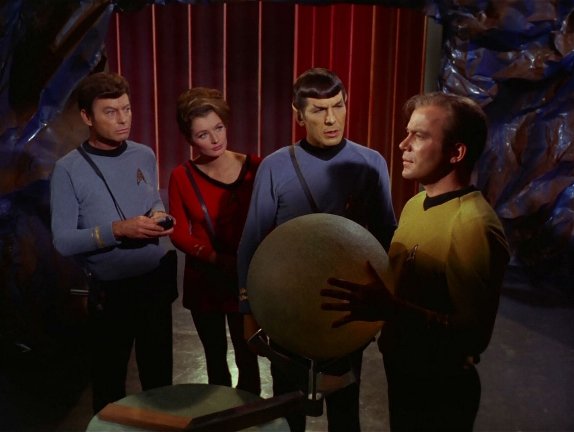Television Review: Return to Tomorrow (Star Trek, S2X22, 1968)

Return to Tomorrow (S02E22)
Airdate: February 9th 1968
Written by: John Kingsbridge
Directed by: Ralph Senensky
Running Time: 50 minutes
The enduring legacy of Star Trek lies in its ability to balance episodic storytelling with profound philosophical inquiries, often embedding its most resonant themes in episodes and films that linger in the cultural memory less than the likes of The City on the Edge of Forever or The Wrath of Khan. Return to Tomorrow, Season 2 episode of The Original Series (TOS), while not universally hailed as a pinnacle of the franchise, exemplifies this dynamic. It is a work of speculative ambition that, despite flaws in execution, interrogates the boundaries of humanity’s relationship with mortality, technology, and risk-taking—a quiet but potent microcosm of Star Trek’s intellectual ethos.
The episode opens in a remote region of space, hundreds of light years beyond any prior human exploration. The USS Enterprise investigates a cryptic distress signal, discovering a planet whose atmosphere has been catastrophically stripped away, leaving behind a desolate shell. This eerie setting becomes the stage for a confrontation with entities that defy conventional biological and temporal logic. The crew encounters Sargon, Thalassa, and Henoch—once corporeal beings who, hundreds of millennia ago, transcended physicality in pursuit of intellectual and spiritual evolution, only to nearly annihilate themselves in a cataclysmic war. Their survival hinges on a chilling proposition: to temporarily inhabit the bodies of Kirk, Spock, and Lt. Commander Ann Mulhall (Diana Muldaur), offering advanced technology as compensation. The narrative’s premise is fraught with ethical tension. McCoy’s visceral skepticism—rooted in his humanist distrust of abstract entities—contrasts with Kirk’s pragmatic acceptance of the deal, framed as a necessary gamble to avert existential threats. This negotiation between fear and curiosity becomes a recurring motif in the episode’s exploration of progress.
What distinguishes Return to Tomorrow from the archetypal “superbeing of the week” episodes is its subversion of power dynamics. Unlike the capricious Apollo or the aloof Organians, Sargon and his kin are not omnipotent tricksters but desperate survivors whose godlike abilities are tempered by their own historical hubris. Their plea for human assistance reframes the typical narrative of cosmic beings manipulating mortals, instead positioning humanity as a pragmatic ally in a shared struggle for survival. This inversion invites deeper questions about the ethics of technological transcendence and the cyclical nature of civilizational collapse. Yet the script stumbles in justifying the entities’ fixation on human bodies over androids, a logical inconsistency that undermines the story’s scientific rigor. The explanation feels tacked on, a concession to dramatic tension over coherent world-building. Nevertheless, the episode’s cerebral tone, particularly in its meditation on the perils of intellectual arrogance, rewards viewers seeking more than superficial sci-fi spectacle.
Central to the episode’s impact is Kirk’s defiant declaration that “risk is our business.” Delivered in the aftermath of his decision to allow Sargon into his body, the speech crystallizes the ethos of space exploration as a fundamentally human endeavor. By invoking the Apollo Moon mission—a real-world achievement still 18 months in the future at the time of the episode’s 1968 airing—Kirk’s monologue acquires a prophetic quality. It reflects Star Trek’s recurring faith in the inevitability of progress, even as the Vietnam-era 1960s saw America’s space program increasingly framed as a diversion from terrestrial crises. The line resonates not merely as a justification for the plot’s risks but as a rebuttal to contemporary cynicism about the value of exploration.
The actors rise to the material’s demands with remarkable nuance. William Shatner, often caricatured for his histrionic tendencies, delivers a performance that oscillates between swaggering command and vulnerable introspection. His portrayal of Kirk “possessed” by Sargon demonstrates his underappreciated ability to modulate between personas. Leonard Nimoy similarly thrives, particularly in scenes where Spock’s logic is subverted by Henoch’s malevolence. The actor’s sly, almost reptilian smiles as Henoch’s true intentions emerge inject a layer of menace into the proceedings, contrasting sharply with Spock’s usual stoicism. Diana Muldaur, meanwhile, anchors the ensemble as Mulhall, whose role as the highest-ranking female Starfleet officer in the series (a lieutenant commander) subtly challenges contemporary gender norms. Muldaur’s performance balances authority with emotional depth, particularly in her scenes with Sargon/Thalassa, whose romantic history adds a tragic dimension to their corporeal reanimation. Her later reprisal of a similar archetype as Dr. Pulaski in Star Trek: The Next Generation underscores her versatility within the franchise’s archetypes.
Yet the episode’s production was marred by tensions that seep into its final cut. Director Ralph Senensky, while competent in pacing the dialogue-driven scenes, was displeased with final product. More significant was the frustration of writer John T. Dugan, a devout Catholic whose original script contained overtly theological themes—most notably the concept of an “immortal soul” for Sargon and Thalassa—that were excised in rewrites aligned with Gene Roddenberry’s humanist atheism. Dugan’s decision to use the pseudonym “John Kingsbridge” on-screen was a rare act of defiance against Roddenberry’s ideological dominance over the series’ philosophical framework. This clash between spiritual mysticism and rational materialism leaves the narrative oddly disembodied, its metaphysical implications diluted by the insistence on secular explanations.
Return to Tomorrow is as a flawed but fascinating artifact of Star Trek’s formative years. Its willingness to grapple with existential questions—even when hamstrung by budgetary constraints and ideological compromises—highlights the series’ capacity to marry speculative fiction with humanist inquiry. While it may never share the pantheon of Trek’s most celebrated episodes, its exploration of risk, mortality, and the seductive dangers of transcendence ensures its quiet relevance in an era where debates over AI and posthumanism have only intensified.
RATING: 7/10 (+++)
Blog in Croatian https://draxblog.com
Blog in English https://draxreview.wordpress.com/
InLeo blog https://inleo.io/@drax.leo
Tiktok https://www.tiktok.com/@drax8802
InLeo: https://inleo.io/signup?referral=drax.leo
Leodex: https://leodex.io/?ref=drax
Hiveonboard: https://hiveonboard.com?ref=drax
Rising Star game: https://www.risingstargame.com?referrer=drax
1Inch: https://1inch.exchange/#/r/0x83823d8CCB74F828148258BB4457642124b1328e
BTC donations: 1EWxiMiP6iiG9rger3NuUSd6HByaxQWafG
ETH donations: 0xB305F144323b99e6f8b1d66f5D7DE78B498C32A7
BCH donations: qpvxw0jax79lhmvlgcldkzpqanf03r9cjv8y6gtmk9